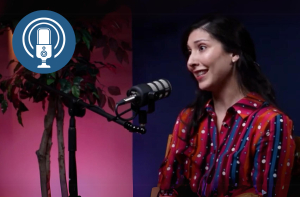Displaying items by tag: burnout
In today's fast-paced world, managing stress and preventing burnout has become crucial. To shed light on this topic, the Utah Hispanic Chamber of Commerce recently hosted our own Dr. Cristina Chévere-Rivera on their podcast, "Hablemos". In her podcast appearance, Cristina delves into burnout, explaining its roots in chronic stress and its physical and emotional impacts.
What is burnout?
Dr. Chévere-Rivera defines burnout as a consequence of chronic stress that persists even with rest. It manifests in both physical and emotional symptoms, such as:
- Tense muscles
- Faster heart palpitations
- Irritability
- Depression
- Anxiety
Recognizing these signs early can help in taking timely action to prevent further deterioration.
What are the symptoms of burnout?
Burnout symptoms can be both physical and emotional. Physical signs include muscle tension and increased heart rate, while emotional signs encompass feelings of sadness, irritability, and a desire for isolation. Burnout can also make it difficult to connect with loved ones and can lead to feelings of detachment and decreased productivity.
How can you manage burnout?
Dr. Chévere-Rivera offers practical strategies for managing burnout.
Long-term strategies for managing burnout:
- Identifying and balancing demands and resources
- Delegating tasks
- Seeking professional help
Short-term strategies for managing burnout:
- Scheduling enjoyable activities
- Practicing mindfulness exercises
- Focusing on physical sensations to ground oneself in the present moment
The best approach to burnout
One of the key points Dr. Chévere-Rivera emphasizes is the importance of addressing burnout collectively. She highlights the power of community and social support in managing stress. Sharing experiences and seeking support from friends, family, and community groups can provide relief and reduce feelings of isolation.
Watch the full podcast episode
S2 Ep 22 Hablemos Podcast: ?¡Descubre cómo el estrés afecta a tu cuerpo y cómo evitar el burnout! ??
‘Burnout’ o el síndrome de quemazón/agotamiento:
El burnout se trata la consecuencia del estrés crónico acumulado que se vuelve persistente y no se alivia con descanso.
Señales:
- Irritabilidad
- Depresión
- Ansiedad
- Dificultad para conectar con seres queridos
- Disminución de productividad
- Tensión muscular
Causas del 'burnout’:
- Carga de trabajo persistente
- Falta de alivio del estrés crónico
El agotamiento puede afectar a cualquier ser humano, especialmente después de eventos globales como la pandemia de COVID-19.
Manejo del burnout:
- Equilibrar responsabilidades con pasatiempos
- Construir una red de apoyo
- Buscar ayuda profesional
- Atención Plena/Mindfulness: ejercicios de respiración y relajación muscular progresiva
- Intente este ejercicio: Apriete los puños mientras inhala, luego suéltelos mientras exhala. Repita durante 60 segundos.
- La Dra. Chévere-Rivera destaca la importancia de la comunidad y el apoyo social. Conectarse con amigos, familiares y grupos comunitarios puede aliviar sentimientos de aislamiento y proporcionar alivio emocional.
Watch the full podcast episode
Mira el episodio completo del podcast Escucha la aparición del Dr. Chévere-Rivera en el podcast en español.
S2 Ep 22 Hablemos Podcast: ?¡Descubre cómo el estrés afecta a tu cuerpo y cómo evitar el burnout! ??
Sources:
https://www.mayoclinic.org/es/healthy-lifestyle/adult-health/in-depth/burnout/art-20046642
https://puebla.anahuac.mx/licenciaturas/blog/estres-burnout-consejos-equilibrio-emocional
https://www.psychologytoday.com/intl/blog/the-race-good-health/201604/stress-and-latino-mental-health
https://www.mayoclinic.org/healthy-lifestyle/adult-health/in-depth/burnout/art-20046642
https://www.psychologytoday.com/us/basics/burnout
The Spirit of Motivational Interviewing
Join us on Friday, March 4, 12:00 p.m. - 1:00 p.m. for "The Spirit of Motivational Interviewing: Connections to Help Foster Compassion for Clients, Decrease Burnout for Clinicians, and Improve Motivation in the Face of Ambivalence", presented by Carl Sallee, Psy.D.
This event is free to attend or $10 for 1.0 CEU, pending approval from UPA, NASW-UT, UAMFT, and UMHCA. This event is virtual, via Zoom. Register here: https://ucebt.com/events
After the event, everyone who registers will be sent the video recording, presentation slides, and CE quiz for CE credit. So, you can receive either live, "in-person" OR asynchronous CEU credit
Here's a bit more information about the presentation:
Motivational Interviewing (MI) is often thought of as a niche skill only applied in certain specialty areas when very specific behavioral change is necessary, but patients are having a hard time finding motivation to make that change. However, this presentation will be focused less on specific application of this therapeutic tool. It is more focused on empowering clinicians through discussion about how the overarching spirit of MI is applicable to any client in any setting, as a way to increase the clinician’s compassion for their patients, reduce provider burnout with challenging clients, and improve therapeutic outcomes by teaming up with ambivalent clients rather than working against them.
This presentation hopes to spread awareness of MI as an inherently person-centered tool that any provider can use to augment and enhance any other type of therapy they already utilize, and to provide practical philosophies from the spirit of MI that psychologists can adopt in their prospective settings.
About the presenter:
Carl Sallee, Psy.D. is a postdoctoral resident and licensed clinical psychologist of the Anxiety/Mood the Dialectical Behavior Therapy, and Assessment/Testing programs at UCEBT. Carl has a background in Third wave Cognitive Behavioral Therapies, Motivational Interviewing, Rogerian Person-Centered psychotherapy, and PTSD treatment.
He has a genuine belief that true empathy, validation, and unconditional positive regard for a person can help decrease any barriers to necessary changes and increase compassion and connection not only with clients, but in the world. He hopes to share this belief and hope with other clinicians during a historical context where compassion and empathy fatigue is a serious threat to burnout, and when we and our clients are likely in more pain than the world has experienced in the recent past.




